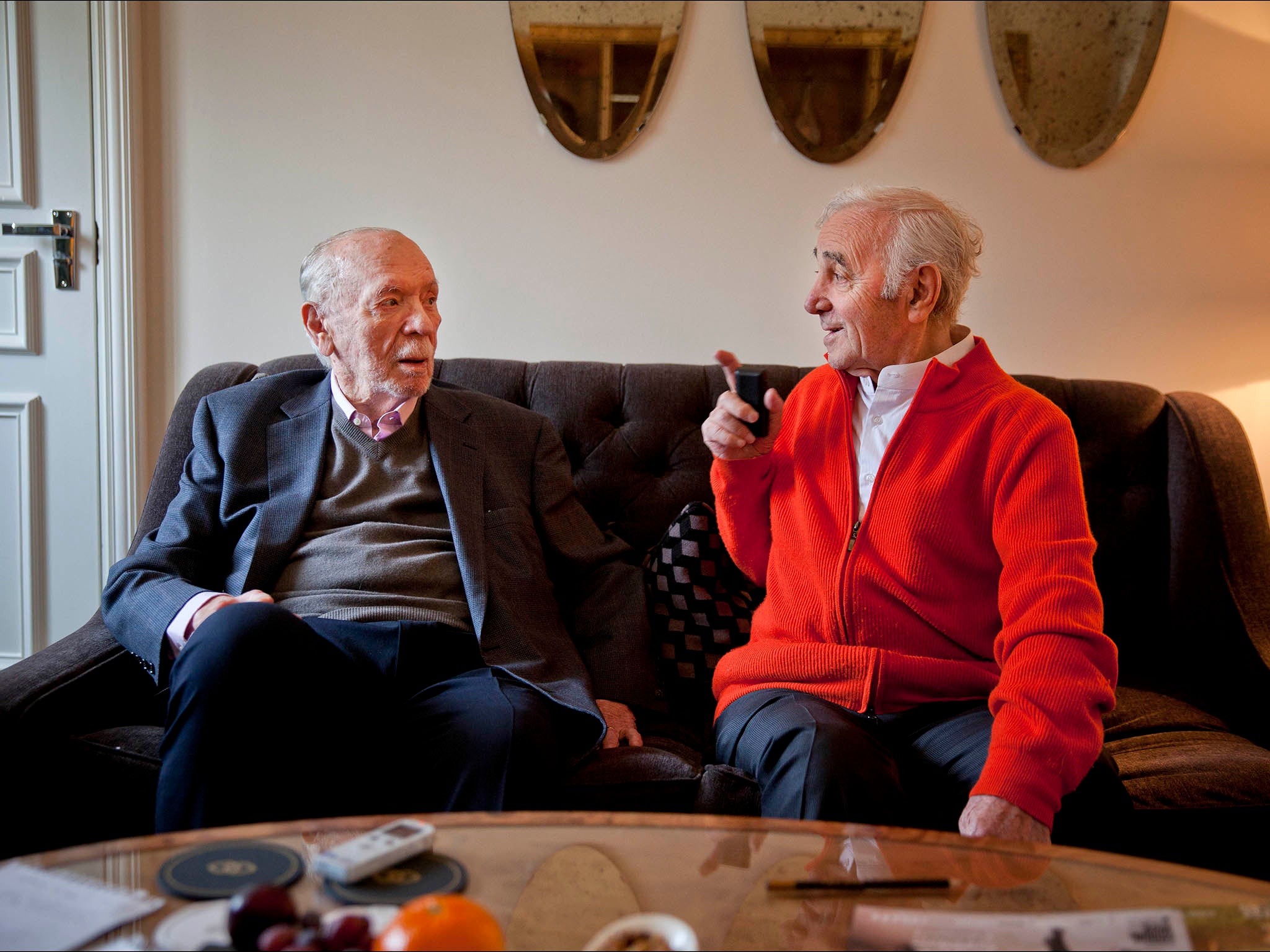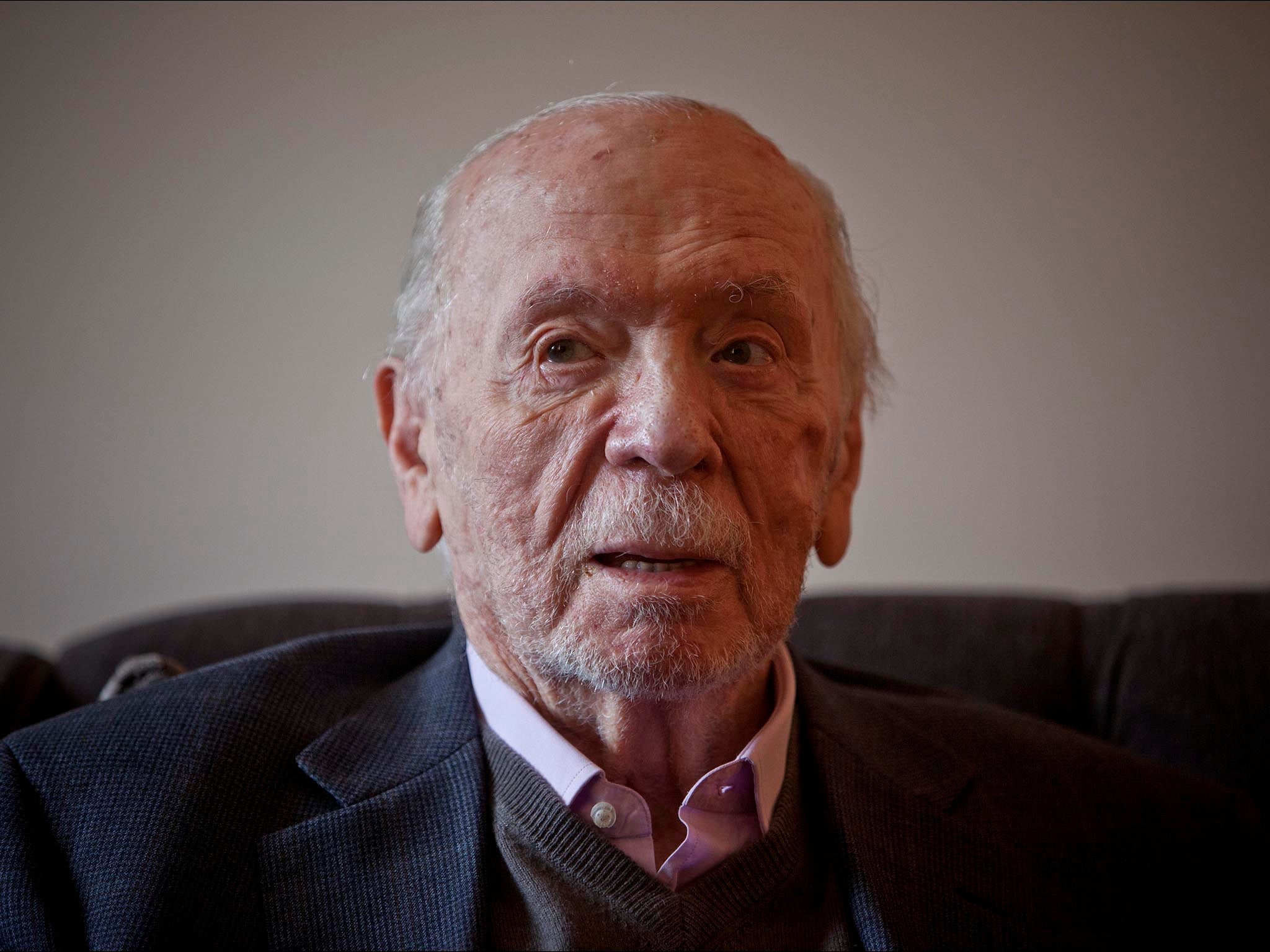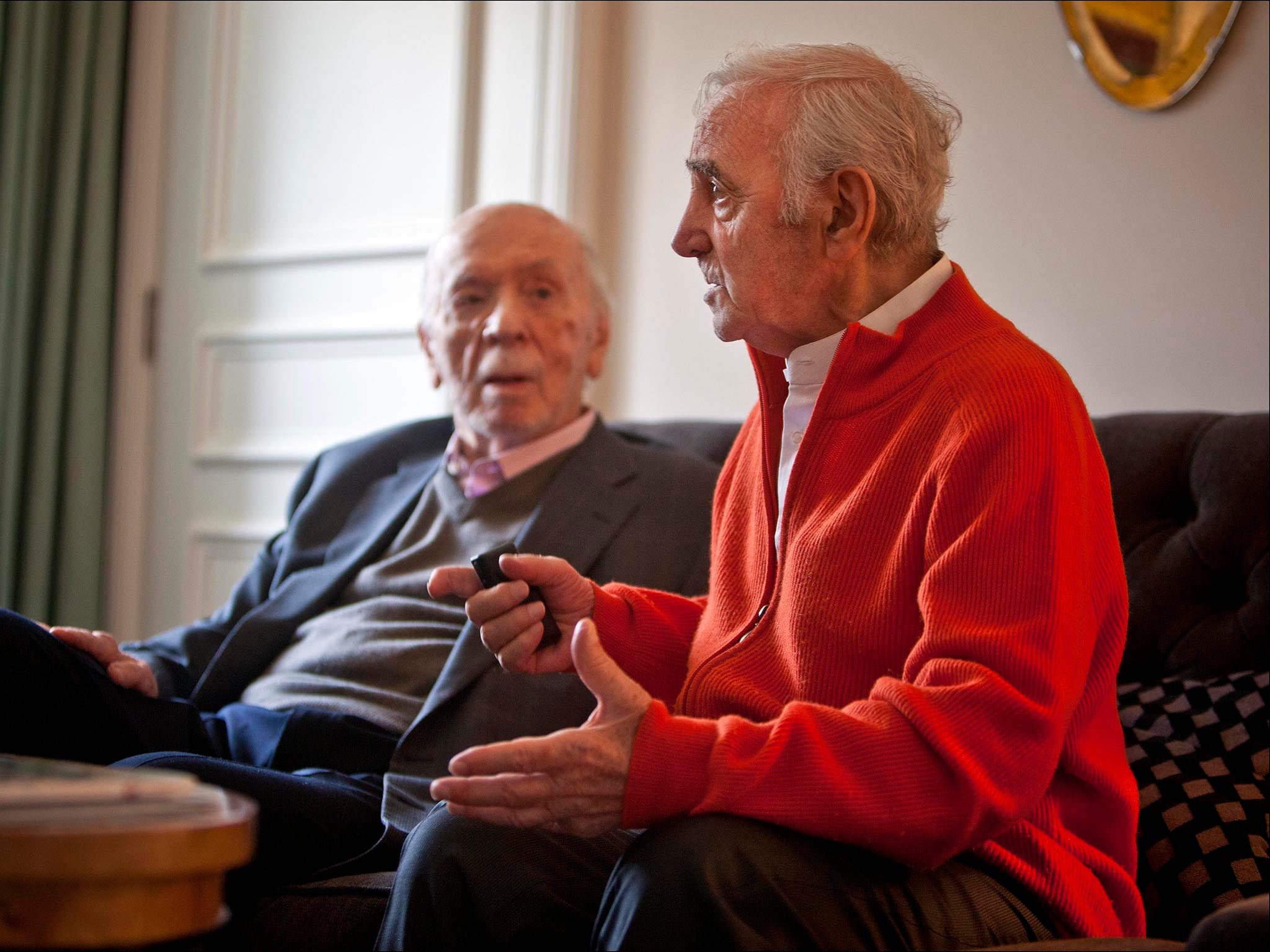Charles Aznavour and Herbert Kretzmer: Joining an expertly guided tour through the history of entertainment
John Nathan joins the double act on a trip down memory lane

Now that he is 90, Herbert Kretzmer, one of the grand old men of musical theatre and lyricist of Les Misérables, tells a joke about the death of songwriters.
“Songwriters never die,” he says in a cultured drawl that, despite the 60 years since he moved to London, still carries a trace of his native South Africa. “They just decompose.”
We are sitting on what is, for nonagenarians, uncomfortably low furniture in probably the plushest suite in one of the poshest hotels in London. It is not Kretzmer staying here, however, but Charles Aznavour, the man for whom Kretzmer wrote the lyrics to the French star’s breakthrough international hit of 1974, “She”.
“How are you Herbie?” says Aznavour as he walks into the room. Napoleonic in height and probably charisma too, Aznavour is a year older than Kretzmer but he moves with the speed and stride of a man in his sixties. And though his hearing is much diminished, the voice – both speaking and singing – remains strong and true. “Slowing down, Charles. Slowing down,” says Kretzmer.

France’s greatest living performer – not a man who enjoys the publicity machine – is in the UK to dutifully do some television and radio interviews ahead of his concert tomorrow at the Albert Hall. But this one – part interview, part reunion – is different.
Aznavour and Kretzmer first met in 1965 when Kretzmer, then a Fleet Street journalist, interviewed Aznavour at his home in Galluis, west of Paris. Edith Piaf, with whom Aznavour travelled the world as a companion, secretary and occasional songwriter (but not lover, he insists) had died two years previously. Aznavour had taken her place as, to use Kretzmer’s words, “the mirror in which the French see subtly reflected their national preoccupation with the game of love.”
“His English was beautiful,” remembers Aznavour of Kretzmer. “I said, have you written songs? He said ‘Yes, one, for....’” Aznavour clicks his fingers, commanding the memory to catch up with the brain. “The English actor...I made a movie with him....”
“Peter Sellers?” asks Kretzmer.
“Yes, Sellers.”
“And Sophia Loren,” says Kretzmer, then adding “Goodness Gracious Me,” the title of his song. It was an early example (1960) of the chart novelty song. Sellers sings in the character of an Indian doctor and Loren his Italian patient. “I said ‘Do you think you could collaborate with me?’” continues Aznavour. “He didn’t say ‘Non!’”
Kretzmer went on to write the English version of many Aznavour songs. “He put in my mouth the best words – for the English public, for my personality – for who I was” says Aznavour. A French romantic down to the marrow of his Paris-born, Armenian bones, Aznavour wrote songs of loss, longing and the poignant passing of time. Kreztmer re-wrote (not translated, for as he is quick to point out “translate” inadequately describes the process of re-imagination) the words to about 30 of them, he reckons.
“Double that,” says Aznavour.
Among them was “Yesterday, When I Was Young”, which did well. But not as well as “She”. Number one for four weeks in the summer of 1974, it was introduced to a new generation in 1999 with Elvis Costello’s version recorded for the film Notting Hill.
“Do you remember how it came about?” asks Kretzmer. “London Weekend Television approached me for a song for the television series Seven Faces of Woman. When they came to me, they originally wanted Marlene Dietrich [to sing it]. I said ‘What is the song to be about?’, and they said ‘the mystery of woman’ – like I knew something about it. They said they were in negotiations with Dietrich. I told them it won’t work. Because if there is one thing I know about the mystery of women it’s that they don’t talk about it. If they did, it wouldn’t be a mystery.
“‘It’s got to be a man,’ I said. “They said ‘Who?’ and I suggested Charles and phoned him the same afternoon. So Marlene Dietrich was out – and Charles Aznavour was in. All in one day. You didn’t know that?”
“I didn’t know,” says Aznavour, his eyebrows rising. “The song took much longer to be a success in France,” Aznavour adds. “It starts with words which are not nice in French.”
He sings the opening line. “She, may be the face I can’t forget...” But in French, he explains, “she” sounds like “chier”, slang for “shit”, and “face” sounds like “fess” or, erm, “spanking”.
“People said, ‘You must change this.’ I said, ‘I change nothing!’”
“I didn’t know that,” says Kretzmer.
“We can still surprise each other, eh?” says Aznavour.
“Not bad for 90” says Kretzmer.

The first time he heard Aznavour play the melody for the song was at the Paris studio of the French producer Eddie Barclay whose singers included Jacques Brel. “The moment you played that first note – daaaaaaa – I heard the word ‘Sheeeee,’” says Kretzmer. “And the whole song just hung from that word. The perfect word, the perfect note. And it made a big difference to your life and to mine.”
For Kretzmer, it gave him the self-belief that his work as a “spare time, part-time” lyricist (he was also theatre critic for The Express and then TV critic for The Mail) was worth persevering with. “It reinforced my self-confidence, which, having grown up in a one-horse town in South Africa, was always a wavering thing. ‘She’ was one of the songs that convinced me to keep going – to strive ever forward,” he says, deploying the rhetoric of endeavour. He adds, self-mockingly, “Then Les Misérables came along and I never had to work again.”
Aznavour gets up from the over-stuffed sofa without so much as a hint of protest from his 91-year-old body, and walks to a chair in the corner of the room on which sits a little rucksack.
“I found a song,” he tells Kretzmer as he unzips the bag. “I’m going to sing it in the Albert Hall, but I’m going to have to read it because I haven’t had time to memorise the lyric.”
He leafs through a fistful of songsheets with lyrics written in large bold typeface. It’s “Remember”.
“Ah!” says Kretzmer.
“Do you remember?”
“No,” chuckles Kretzmer.
“Your lyrics are beautiful. And I wrote beautiful music for it. Read it,” orders Aznavour. Kretzmer clears his throat and reads.
“The years begin to go so fast,
Each one more quickly than the last,
It’s time to gather up the past,
Remember.”
“Let’s be pretentious for a second,” says Aznavour. “We were good.”
Charles Aznavour’s only UK show is at the Royal Albert Hall tomorrow (www.ticketline.co.uk)
Join our commenting forum
Join thought-provoking conversations, follow other Independent readers and see their replies
Comments